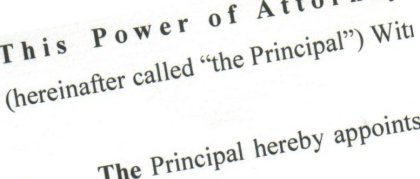There are two types of power of attorney (PoA) in England. There is a lasting power of attorney (which replaced the enduring power of attorney), and the ordinary power of attorney.

The lasting power of attorney can be used to grant someone the power to handle your financial, property and health affairs if you are no longer able to deal with them yourself due to ages / illness / reduced mental capacity.
I’m not going to talk about the lasting power of attorney. I’m writing here about the ordinary power of attorney. I’m no legal expert so make sure you consult a proper solicitor before arranging anything, but maybe my experience will help you.
The ordinary power of attorney is a much more limited power, which can be used for very specific purposes. For example:
- Allowing a relative or trusted person to handle specific aspects of your finances if you go abroad.
- To allow someone to carry out a specific transaction on your behalf.
Arranging one is very simple.
First find a solicitor. You can use the Law Society Find a Solicitor site to search for one.
You don’t actually need to find one near you as there is no need to meet up with the solicitor to arrange this. In fact you may find that if you use a solicitor in a ‘cheaper’ part of the country you’ll get a better rate than one in London for example.
Once you’ve picked a solicitor you should get a quote. You’ll need to tell them exactly what you want by phone or email. Sometimes email has advantages for these kind of dealings as what you want is in writing, and you have a record of your communications.
You’ll need to ask for something such as “an ordinary power of attorney to allow my father to arrange a lease extension for my flat”.
The solicitor should be able to give you a price – and in usual solicitor fashion they’ll probably quote it without VAT so you’ll have to take that into account. When I arranged an ordinary PoA I was quoted a figure of £95.00 + VAT. Which is £111.63.
If you are happy with the price give the go ahead. At this point you are committed to paying for the solicitor’s service.
The solicitor will need the full names and addresses of yourself, and the person whom you are granting the power of attorney to. This person is known as the ‘attorney’. You should also re-state what the scope of the PoA is.
You solicitor will then prepare the document. This will take them literally about one minute to do as all they do is to fill in some gaps on a PoA template. They’ll then probably post it to you.
When you get it you’ll probably see it is just a single page of A4 paper. First check that all the details are correct. Then you’ll need to sign it in the presence of a witness, who will also need to add their details to the form.

You’ll then need to post the form back to your solicitor. They may also ask you to send them some photocopied proof of your address and identity (such as a bill, passport, or driving licence). They’ll probably want your money as well at this point.
Then once they have received it they’ll check that you’ve filled it in correctly, photocopy it for their records, and send the original one back to you.
And that’s it. If the solicitor is efficient the whole process might be completed in about a week – and the only reason it takes this long is due to the posting of documents back and forwards.
It isn’t difficult to arrange, you can do it all by email and post. And at the end of it you get a single sheet of A4 paper for a cost of over £100. But if that piece of A4 paper allows you to do what you need it could be worth it.
Other options
If you want a cheaper option than going with a solicitor you can get off the shelf ordinary power of attorney forms from clickdocs and Desktop Lawyer . I can’t however vouch for what they service is like, or how easy their forms are to use.
Certainly if you are willing to pay the money to use a qualified solicitor arranging an ordinary power of attorney is very straight forward and quick.
It is true that it may not take very long for a Solicitor to do the work for you but at the end of the day you are paying for the skill and knowledge built in to the equation.
It is possible to get this done more cheaply though by qualified lawyers. who promote legal services on a lower cost/fixed cost model like at Lawscape.
We do Powers of Attorney for £65 including VAT unless there are complex arrangements in which case we would re-quote a price for the job.
Hey,
I did something very similar. I called around a few local solicitor firms and was quoted between £80 – 170. So I decided to have a quick search on the web, as you do. I ended up downloading one from here http://www.powerofattorney.org.uk/General_Power_Of_Attorney.asp, it ending up saving me quite a lot of money. So have a look around would be my advice or use the same one I did.
Michael
According to my research, apart from the attorney, there is no restriction on who can be a witness for an ordinary PoA. It is not required that they be a solicitor or a notary and consequently no official stamp is required.
However I am being told that the High Court Clerk in London will not accept my PoA without a solicitor’s stamp. It is an extremely limited PoA, just giving someone power to present documents to the court, as I cannot do it in person being out of the country.